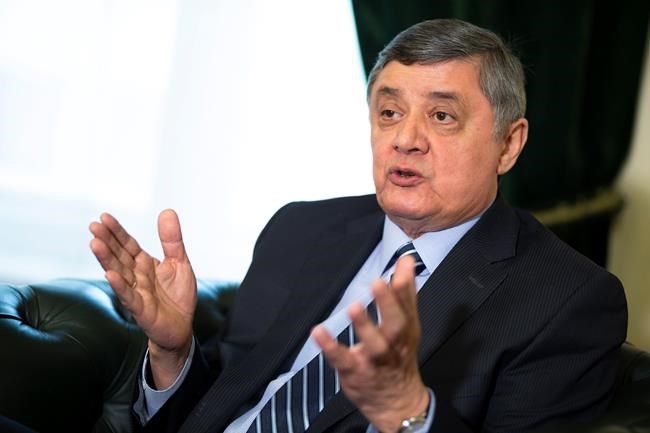
Russian presidential envoy to Afghanistan Zamir Kabulov gestures while speaking during an interview to the Associated Press in Moscow, Russia, Wednesday, Feb. 13, 2019. Kabulov said the U.S. has failed in Afghanistan and that helped open the way for Moscow to expand its clout as a mediator between Afghan factions. (AP Photo/Alexander Zemlianichenko)
Republished February 14, 2019 - 1:45 AM
Original Publication Date February 13, 2019 - 4:16 AM
MOSCOW - A senior Russian envoy asserted Wednesday that the U.S. has "completely failed" in Afghanistan, opening the way for Moscow to play the role of peace broker in the war-torn country from which the Soviets pulled out in 1989.
The remarks by Zamir Kabulov, President Vladimir Putin's envoy for Afghanistan, followed a Moscow-hosted meeting last week that gathered former Afghan officials, opposition figures and the Taliban — but completely sidelined Afghan President Ashraf Ghani's government.
The comments Underscore Moscow's ambition to expand its clout in Afghanistan at a time when the United States, with its envoy Zalmay Khalilzad, has stepped up efforts to find a peace deal for the country and is holding a series of talks with the Taliban.
In an interview with The Associated Press, Kabulov said he believes many Afghans now see Russia as a useful broker that could help advance the political process, despite lingering memories of the 10-year Soviet invasion.
Kabulov argued that the protracted, 17-year U.S.-led war in Afghanistan helped change Afghan perceptions of the Soviet invasion and has made many local leaders support the idea of Russian mediation.
"They know very well Russia isn't seeking military bases, Russia doesn't need their natural resources," he said, adding that Russia only wants to see Afghanistan have an "independent leadership" and become a "neutral state" — a clear jab at Washington and America's influence over Kabul.
The Soviet invasion of Afghanistan failed to defeat the U.S.-backed anti-communist guerrillas, known as mujahedeen, or holy warriors. Following the Soviet pullout and the collapse three years later of the communist government, a brutal war between rival mujahedeen groups erupted, engulfing Kabul and killing tens of thousands, mostly civilians, until the Taliban took power in 1996.
America went to war with the Taliban after the September 11, 2001 attacks over the insurgents' harbouring Osama bin Laden and al-Qaida.
Asked if America has fulfilled its goals in Afghanistan, Kabulov said: "It has completely failed."
"America and NATO have stayed there for 17 years and we now see a completely different picture: we have the strong Taliban movement and plus now we have Daesh," he added, referring to Afghanistan's Islamic State affiliate, which emerged a few years ago.
Kabulov urged the Trump administration to pull American forces out of Afghanistan as quickly as possible, and focus on financial assistance to Kabul, to help post-war recovery.
"In the end of the game, America will have to withdraw," he said. "The later they (Americans) withdraw, the higher the cost will be. ... The best way is to give Afghans this economic capacity to rebuild the country."
Kabulov, who served as Russia's ambassador in Kabul in 2004-2009, also claimed the U.S. has failed to properly train the Afghan military for a guerrilla-style war against the Taliban.
"They should have trained an anti-guerrilla army instead of a conventional one," he said.
The U.S.-Russia relations have steadily deteriorated over the past years and are now at the lowest point since the Cold War in the wake of Moscow's annexation of Crimea, its support for Syrian President Bashar Assad's government, allegations of Russia' meddling in the 2016 U.S. presidential election and other disputes.
Kabulov said Russia sees the Taliban as part of the Afghan nation's peace process after the insurgent movement abandoned the idea of a global jihad, or holy war.
"The Taliban are Afghans," he said. "They have a legitimate right to be worried about the future. Of course, we don't accept the way they are doing, but they didn't have an option to be only a pure political party. They are fighting for their cause, and they are bleeding for this cause."
___
Associated Press writer Kathy Gannon in Kabul, Afghanistan, contributed to this report.
News from © The Associated Press, 2019